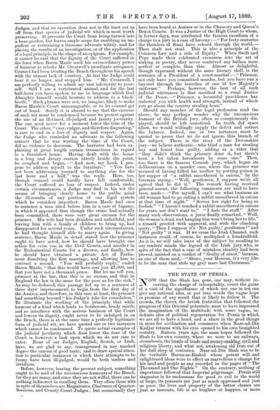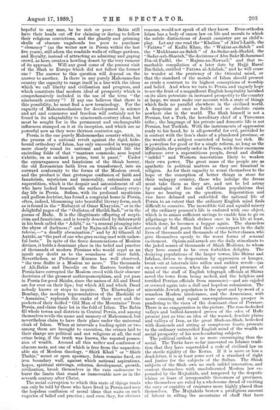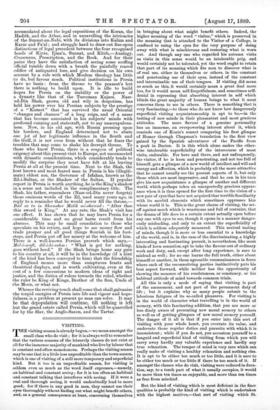THE STATE OF PERSIA.. N OW that the Shah has gone,
one may, without in- curring the charge of inhospitality, count the gains of a visit of the significance of which not one in ten can give any rational idea, or put into words the vague hope or promise of any result that is likely to follow it. The crowds, the cheers, the lavish festivities that followed the progress of this Oriental potentate, seem to have impressed the imagination of the multitude with some vague, in- definite idea of political regeneration for Persia in which we are all to have a hand, and a share in the good things in store for civilisation and commerce when Nasr-ud-Din Kadjar returns with his eyes opened to his own benighted country. Sixteen years ago, the same hopes followed the Shah to his own country, where we were to see railways, steamboats, the bustle of trade and money-making, civil and religious liberty, and what not, awakening old Iran out of her dull sleep of centuries. Nasr-ud-Din Shah was to be the veritable Harun-ar-Rashid whose potent will and enlightened ideas were to effect as marvellous a change for his land and people as any recorded in the pages of " The Thousand and One Nights." On the contrary, nothing of importance followed that Imperial pilgrimage. Persia still stagnates in its uselessness for good or evil to the world at large, its peasants are just as much oppressed and just as poor, the lives and property of the better classes are just as insecure, life is no brighter or happier, or more hopeful to any man, be he rich or poor : Babis still have their heads cut off for claiming or daring to follow their religious convictions, and the ghastly and grinning skulls of obscure vagabonds too poor to purchase " clemency" (as the writer saw in Persia within the last five years), still adorn the roadside walls of village gardens, and Royalty, instead of attracting an admiring and gaping crowd, as here, creates a howling desert by the very rumour of its approach. Will any good come of the present visit of the Shah to Europe which did. not follow the former one ? The answer to this question will depend on the answer to another. Is there in any purely Mahommedan country the capacity to range itself in a. line with the ideas which we call liberty and civilisation and progress, and which constitute that modern ideal of prosperity which is comprehensively included in the use of the term " the nineteenth century "? If any one believes that there is this possibility, he must find a new terminology. For the capacity of Mahommedanism for development in science and art and commerce and freedom will certainly not be found in its adaptability to nineteenth-century ideas, but must be sought for in the permanent and unchangeable influences stamped on it at its inception, and which are as powerful now as they were thirteen centuries ago.
Persia is the one purely Mahommedan country which, in the process of a national revolt against the rigid, hide- bound orthodoxy of Islam, has only succeeded in wrapping more closely round its national and political life the encircling folds of that " manteau commode, sous lequel s'abrite, en se cachant a peine, tout le passe." Under the extravagances and fanaticism of the Shah heresy, the old Zoroastrian faith lives on transformed, into an outward conformity to the forms of the Moslem creed, and the product is that grotesque confusion of faith and fanaticism, mysticism and immorality, rationalism and superstition, which is the despair and astonishment of all who have looked beneath the surface of ordinary every- day life in Persia. Sufism, with its profound mysticism and godless doctrine, has found a congenial home in Persia, often, indeed, blossoming into beautiful literary form, such as is found in the " Rubaiyat of Omar Khayyam," or in the delightful pages of the " Gulistan of Sheikh Sadi," or in the poems of Hafiz. It is the illegitimate offspring of scepti- cism and fanaticism, and is tersely described by Sahrawardi in his book called the " Adabi," as "a sensual plunging into the abyss of darkness ;" and by Najm-ud-Din as Kanihat tahrint,—" a deadly abomination ;" and by Al Ghazali Al Antaki, as "the part of one who goes raving mad with unlaw- ful lusts." In spite of the fierce denunciations of Moslem divines, it holds a dominant place in the belief and practice of thousands of modern Persians who would repel as an insult any doubt as to the soundness of their faith. Nevertheless, as Professor Kuenen has well observed, " the true Sufite is a Moslem no more." The thousands of Ali-Ilahis and Daoodis on the Eastern borders of Persia have corrupted the Moslem creed with their obscure doctrines of the grossest anthropomorphism, and yet pass in Persia for good Shiahs, since the names of Ali and Baud are for ever on their lips ; but which Ali and which Daud nobody knows or stops to inquire. The Khawadjas of Bombay, the modern representatives of the Hashish or " Assassins," replenish the ranks of their sect and the pockets of their deified " Old Man of the Mountains " from Persia, and claim their lot in the fold of Islam. The Babis fill whole towns and districts in Central Persia, and among themselves revile the name and memory of Mahommed, but nevertheless claim to have their place under the universal cloak of Islam. When at intervals a leading spirit or two among them are brought to execution, the crimes laid to their charge are political and not religious at all, the real crime being, if the truth was known, the reputed posses- sion of wealth. Around all this welter and confusion of obscure sects, not one of which is free from the unpardon- able sin of Moslem theology, " Shirk Khafi " or " Shirk Thahir," secret or open apostasy Islam remains fixed, an iron boundary wall, against which national aspirations, hopes, spiritual strivings, reforms, development, growth, civilisation, break themselves in the vain endeavour to burst the limits that stand as immoveable now as in the seventh century after Christ.
The social corruption to which this state of things tends can only be told by those who have lived in Persia and seen the hopeless confusion of moral ideas that waits on such vagaries of belief and practice ; and even they, for obvious reasons, would not speak of all they know. Even orthodox Islam has a body of canon law on life and morals to which the subtle distinctions of Jesuit casuistry are as child's- play. Let any one read the "Khalasa" of Abu'l-Laith, the "Fatawa " of Kadhi Khan, the " Wakiat-as-Sahih " and the " Mukhtasar-as-Sahih " of As-Sadar-ash-Shahid, the " Sadar-ash-Shariah," the decisions of Abu BakrMohammad Ibn-ul-Fadhl, the " Majma-an-Nawazil," and that re- markable compilation of a later date by Hajji Rasul Ibn Salah, entitled " Fatawa al-Adaliah," and he will cease to wonder at the pruriency of the Oriental mind, or that the standard of the morals of Islam should present so crude a contrast to its highest conceptions of worship and belief. And when we turn to Persia and vaguely hope to see the fruit of a magnificent English hospitality lavished on its alien potentate in increased prosperity to the country at large, we must make our account with a state of things which finds no parallel elsewhere in the civilised world. A despotism at once so feeble and so absolute exists nowhere else in the world. The Shah himself is not a Persian, but a Turk, the hereditary chief of a Turcoman tribe ; the language of his private and domestic life is not Persian, but Turkish. With the instruments of oppression ready to his hand, he is all-powerful for evil, provided he is content with the lion's share of a plundered province, or the wealth of a subject convicted of being too rich. He is powerless for good or for a single reform, so long as 'the Mujtahids, the priestly order in Persia, with their enormous influence over a superstitious people, dread and dislike " infidel " and Western innovations likely to weaken their own power. The great mass of the people are as apathetic in political matters as they are fanatical in religion. As for their capacity to rouse themselves to the hope or the conception of better things in store for their unhappy country, those who indulge the dream must take them as they are, and not be led astray by analogies of free and Christian populations that have no bearing on the question. Superstition and vice have debased and enfeebled the national life of Persia to an extent that the ordinary English mind finds difficult to conceive. The incredible toil and squalid misery of the ordinary peasant's life is endured with one object, which is to amass sufficient savings to enable him to go on pilgrimage to the Shiah shrines once in his life at least, which done, he becomes a beggar again. The shameless avowals of Sufi poets find their counterpart in the daily lives of thousands and thousands of the better classes, who give themselves openly to the worst forms of sensual excitement. Opium and arrack are the daily stimulants to the jaded senses of thousands of Shah Moslems, to whom they have ceased to be • even forbidden delights. The decaying populations of the larger towns, like Shiraz and Isfahan, driven to desperation by oppression or hunger, break out at intervals into sullen and sudden revolt—(as on a recent occasion, when the courage and presence of mind of the staff of English telegraph officials at Shiraz saved the town from being sacked, and the helpless and terrified Persian officials from massacre)—and are cajoled or coerced again into a dull and hopeless submission. The miserable Jewish population is the sport and by-word of a senseless Moslem intolerance, and the Armenians, with more cunning and equal unscrupulousness, prosper in pandering to the vices of the dominant class of Persiazip. There is no exaggeration in the picture. The rose-bedecked valleys and bulbul-haunted groves of the odes of Hafiz present just as true an idea of the wasted, desolate plains and valleys of Iran, as the great Shah-an-Shah, bedecked with diamonds and sitting at sumptuous feasts, presents to the ordinary untravelled English mind of the wealth or social prosperity of his much-enduring subjects. The political outlook is no more encouraging than the social. The Turks have so far innovated on Islamic tradi- tion that they have superadded a code of civilised law on the sterile rigidity of the Koran. If it is more or less a dead-letter, it is at least some sort of a standard of right and justice for the subjects of the Sultan. The Shiah subjects of the Shah own no such infidel innovation, and content themselves with unadulterated Moslem law ex- pounded by the Mujtahids, and tempered by the despotic whims or fears of irresponsible Governors of provinces, who themselves are ruled by a wholesome dread of exciting the envy or cupidity of creatures more highly placed than themselves. The Mujtahids bestow a prodigious amount of labour in sifting the mountains of chaff that have accumulated about the legal expositions of the Koran, the Hadith, and the Athar, and in unravelling the intricacies of the Sunnat-an-Nabi, with its divisions into Kalam and Karar and Fa'al ; and struggle hard to draw out fine-spun .distinctions of legal precedent between the four recognised heads of Kiyas, Ijma'a, Sunnat, and Kitab,—Analogy, Consensus, Prescription, and the Book. And for their ipains they have the satisfaction of seeing some scoffing official tumble down with a breath the painfully reared .edifice of antiquated lore, and give decision on his own account by a rule with which Moslem theology has little to do, but favour much. Political institutions in Persia have no basis : from the throne to the peasant's but there is nothing to build upon. It is idle to build ;hopes for Persia on the stability or the power of a dynasty like that of the Turcoman Kajars. Naar- ud-Din Shah, grown old and wily in despotism, has held his power over his Persian subjects by the prestige of a " Kismet " that has survived the usual Oriental changes and chances " of a long reign, and of a name that has become associated in his subjects' minds with profound cunning and statecraft, not to say unscrupulous- ness. Now, in his old age, with Russia pressing upon his borders, and England determined not to abate one jot of her legitimate influence in the South and the Gulf, it is not even from without that he fears the troubles that may come to shake his decrepit throne. To those who know Persia, there is a soupcon of political exigency about this present visit to Europe, not unconnected with dynastic considerations, which considerably tends to modify the surprise they must have felt at his leaving Persia at all at the present time. Next to the Shah, the .best known and most feared man in Persia is his (illegiti- mate) eldest son, the Governor of Isfahan, known as the :Zil-i-Sultan, or the Shadow of the Sultan. If popular report in Persia is worth anything, he is the King's shadow in a sense not included in the complimentary title. The Shah, his father, remembers (Nasr-ud-Din never forgets) those ominous words of the Zil, used many years ago, in reply to a reminder that he would never fill the throne,— Bad as to in Shamsher Malik mi-shawad : "After thee this sword is King." At any rate, the Shah's visit has one effect. It has shown that he may leave Persia for a .considerable time and no great harm result from his absence. This may be small consolation to those who speculate on his return, and hope to see money flow and trade prosper and all good things flourish in his foot- steps, and Persia put off her misery at the welcome of him. There is a well-known Persian proverb which says,- Mal-i-muff, dil-i-bi-rahn : " What is got for nothing, goes without heed." If the Shah brings home any gain to his country at all, it will be in the knowledge (if a hint of the kind has been conveyed to him) that the friendship of England means more than sumptuous feasts and theatrical displays, and is worth cultivating, even at the -cost of a few concessions to modern ideas of right and justice, and the duties of rulers towards the ruled, whether the ruler be King of Kings, Brother of the Sun, Uncle of the Moon, or what not.
Whence the reviving touch shall come that shall galvanise the torpid energies of Persia into life and vigour and hope- fulness, is a problem at present no man can solve. It may be that depopulation will continue, till nothing is left but the grand estate called Persia, which will be quarrelled for by the Slav, the Anglo-Saxon, and the Tartar.




































 Previous page
Previous page